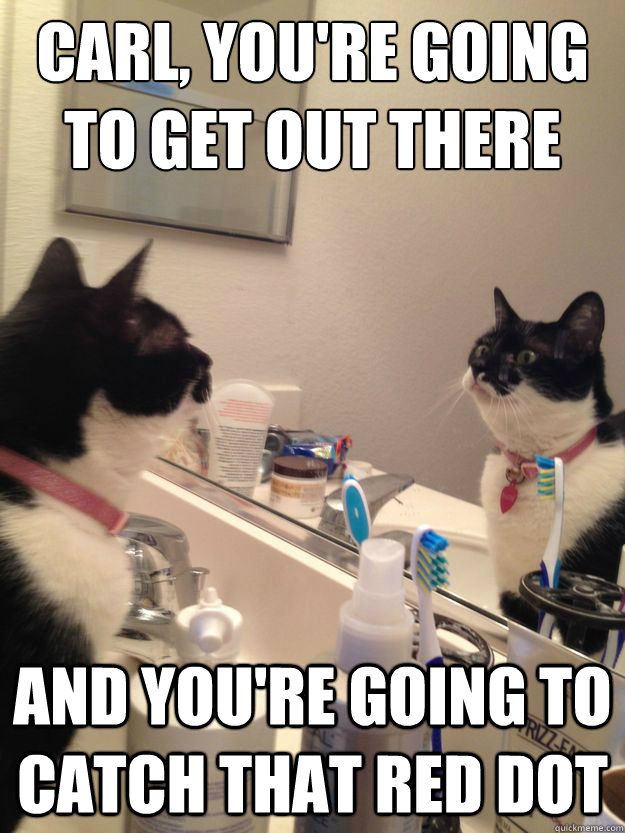
You know how kids sometimes go around narrating everything they are doing?
That is the early signs of their internal dialogue/ self-talk. As we get older, we internalise it (mostly). It becomes our ‘thinking’.
Some people ‘think’ in words and sentences. That is what the bulk of my internal dialogue is, basically my own voice, in my head, describing the world and others and me as I experience life.
Others think more in images. They see stuff in their mind’s eye, which serves a similar purpose, to make sense of the world and provide guidance for making decisions and choices.
For some it is a mix of both. For example, my thinking occasionally includes faint images of the past (memories) or simulations of the future, that correspond to what my internal dialogue is at the time.
A lot of your thinking happens without you specifically creating it or choosing it. Sit quietly for a few minutes and you’ll notice words and images come and go of their own accord. You can get the sense that you are more of a witness to your thinking, than you are the creator of your thinking.
That doesn’t mean however that you can’t make choices to improve your internal dialogue/ self-talk
Why would you want to improve your internal dialogue/ self-talk?
If your internal dialogue is anything like mine, it can tend towards the negative. Negative about myself. Negative about the world. Negative about other people.
Sometimes that negativity can get you down, take you away from activities and tasks that you enjoy, contaminate the time spent with other people. Sometimes you can ‘overthink’ something which gets in the way of you enjoying an experience. Basically, sometimes your self-talk isn’t working in your favour.
A simple example for students is the self-talk that follows getting a bad mark on an assignment or exam. If you could get into the head of one of your peers at the point at which they look at their grade and see it is a bad one, you’d find a whole lotta things that are probably quite familiar to you: self-criticism, anger or frustration at lecturer/tutor, doubts about personal ability, thoughts of quitting, envy of other people’s good grades, and lots more.
All of these are normal reactions, but you can see that they don’t really help the person learn from the experience so they get a better grade on the next assignment or exam. What you hope is that after a bit of time, the person’s self-talk shifts to something more proactive: encouraging self to read the assignment comments, deciding to devote a little more effort on the next assignment, thinking about having a talk to lecturer about things they aren’t understanding.
If that doesn’t happen though, then the negative self-talk might continue and this places the individual at greater risk of not doing well on the next assignment. You can get caught up in negative self-talk, impairing your ability to make good choices and experience the world fully.
That is why you might want to update or upgrade your internal dialogue.

So how is it done?
If you were to meet a therapist who did Cognitive Behaviour Therapy (CBT) they might work with you to identify irrational or unhelpful thoughts and challenge them. They might notice that you spend a lot of time thinking “I’m stupid’ and encourage you to collect evidence that the thought ‘I’m stupid’ is incorrect.
If you were to meet a therapist who did Acceptance and Commitment Therapy (ACT), they might work with you to learn how to notice and distance yourself from upsetting or unhelpful thoughts. They’d teach you how to distance yourself from the thought ‘I’m stupid’ so it didn’t get in the way of you living a fully connected life.
Something that I’ve been experimenting with a little bit more in my own life recently, is trying to add positive self-talk to my everyday life. I used to dismiss this approach because it felt disingenuous to try and think positive happy thoughts, when things weren’t necessarily going well.
But I’ve discovered two things you can add to your internal dialogue that don’t feel fake or forced.
- Encouragement
When we see loved ones going through difficult times, we usually don’t tell them to think positively, but we do give them encouragement. We might try reminding them of their capabilities. Encourage them to try a different approach. Remind them that we think they can do it. Encourage them to keep working towards their goals. Encourage them to seek or ask for help if needed. Basically, we try to keep them moving forward.
There is no reason why you can’t do this for yourself.
I am a nervous flyer, so when I fly I try to encourage myself – ‘you can do this‘, ‘even though you are nervous, you’ll get through this‘, ‘this will end OK‘, ‘you’re heading somewhere cool to do new things‘. I don’t try to pretend like I am happy or enjoying myself, but I remind myself that I believe I can cope.
A phrase I repeatedly hear is ‘you got this‘ which in intended to signal to another person (or yourself) that you believe in their (your) ability to cope with whatever is happening to them (you).
See if you can get in the habit of using such phrases more regularly in your life when confronted with small challenges or a desire to avoid important tasks/ activities. See if using it orients you more effectively to the task at hand.
As a starting point try using encouraging statements when sitting down to revise for an exam or start a new assignment that has you freaked out. Try encouraging yourself as you would a friend sitting down to do the same task. If it helps in this setting, try using it in other difficult situations such as a break-up or argument with friend.
Remember the purpose isn’t to try and convince yourself to be happy or positive, it is simply to remind yourself that you can cope with what is happening.
- Celebration
Anyone who has hung out with me recently, will have heard me crapping on about Tiny Habits.
Tiny Habits is a book/program by a Stanford University researcher called BJ Fogg that helps people make positive changes in their life (or break bad habits).
A central component to how he helps people make changes is to teach them how to use celebrations.
Celebrations are very small acts or thoughts that we engage in to mark the successful engagement in a desired behaviour. Celebrations are teeny doses of reward, delivered to oneself at the point at which we do something successfully.
For example, if I do my 10 minutes of meditation in the morning, immediately after I say to myself ‘Nice work Gareth!’ and take a moment to feel the satisfaction.
When I arrive at work and fire up my computer and put 3 tasks for the day in my calendar, I do a very brief happy dance to mark the occasion.
For those of my generation, who grew up watching the Die Hard films (only the first 3), I’ve recently been playing with using ‘Yippee ki-yay motherfucker!’ to celebrate things during the day that I am particularly happy with. Apologies for the potty mouth.
The thing is, there are lots of things that happen during the day that are indicators of your ability and commitment. Celebrations are simply about rewarding yourself for those achievements. They don’t need to be big achievements either. The goal is to get in the habit of celebrating the little victories in life.
Start by picking activities or actions that you are already doing. For example, you might do a little mental celebration when you get up in the morning at the exact time of your alarm. Or you might imagine applause as you finish brushing your teeth. Celebrate these little existing moments and then start using celebrations when trying to establish new habits.
Stumped for what to try as a celebration? – Here is 102 possible ways of celebrating.

What you’re essentially trying to do here is to nudge your brain towards noticing the positive
Brains, left to their own devices, can tend towards the negative. I’ve heard this described as a function of the evolution of our brains. Brains that were better at identifying threats and danger kept the people attached to those brains alive for longer, who could then reproduce.
We are all the product of our cautious, frisky, threat-identifying ancestors (thanks Ancestors!!)
We don’t want our brains to lose their ability to identify threats. We do however want our brains to get better at
- telling us we can cope with challenges
- noticing and celebrating achievement
The two exercises above are simple ways to start training your brain in both of these ways.

